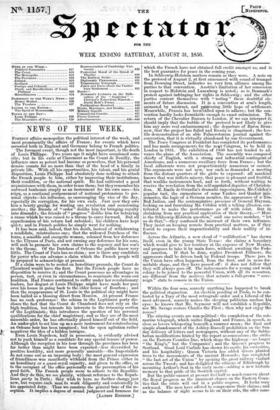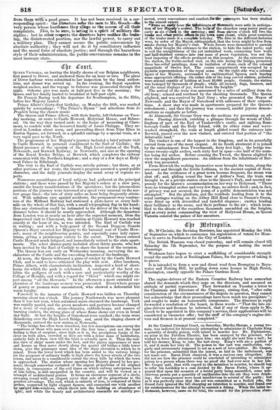Within the four seas, scarcely anything has happened to break
the political stagnation. An election pending at Poole, to be con- tested by a Tory of the most retrograde order and a Liberal of the most advanced, scarcely makes the sleeping politician unclose his eyes : he knows that Mr. Seymour will not establish a Republic, nor Mr. Savage restore Charles the First ; then why not enjoy the recess ?
The stirring events are non-political : the completion of the sub- marine telegraph, which unites England and France, in speech, as close as lovers whispering beneath a summer moon; the final and simple abandonment of the Ashley-Russell prohibition on the Sun- day delivery of letters and newspapers, without any of the Sabha- tenon modifications hinted by the report as concessions ; the strike on the Eastern Counties line, which stops the highway—no longer " the King's," but the Companies' ; and the Queen's progress to Scotland. Good Lord Carlisle has shown his castle, his curiosities, and his hospitality; Queen Victoria has added divers planted trees to the monuments of the ancient Howards; has completed " the last act of the Union " by opening the great railway viaduat across the Tweed ; and has delighted the citizens of Edinburgh by mounting Arthur's Seat in the early morn—adding a new historic memory to that pride of the Scottish capital. But the public cannot at present feel half so much concern about the Royal progress as the imminent chance on the Eastern Coun- ties that the crisis will end in a public nogress. It looks very awkward. The men have offered to compromise their claims; and as the balance of right seems to lie on their side, the offer came
from them -still's good grace. It has not been received in a cor- responding spirit : the Directors refer the men to Mr. Gooch—the very person whose harshness they allege as the souree of all their Complaints. This, to be mire, is acting in a spirit of military die- ciphne ; but in other respects the directors have neither the traria- ing, the disinterested position, nor the lawful power, to carry out a military plan. They cannot secure the public convenience by absolute authority ; they will not do it by conciliatory influence and the moral force of absolute justice ; and through the hazardous style of theiradministration, the public convenience remains in the most insecure state.



























